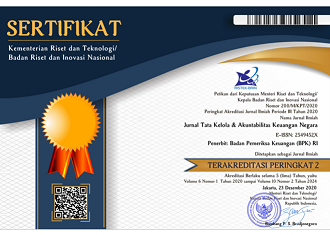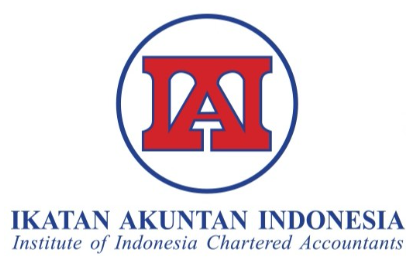SELF-EFFICACY AND CONTROLLABILITY AS WHISTLEBLOWING INTENTION PREDICTORS OF FINANCIAL MANAGERS IN EDUCATIONAL INSTITUTIONS
DOI:
https://doi.org/10.28986/jtaken.v4i2.213Keywords:
Self efficacy, controllability, whistleblowing intentionAbstract
Whistleblowing policy is considered as an effective technique in an investigation audit that is useful for the organization to avoid losses due to fraud. However, employees who intend to report fraud encounter ethical dilemma. Whistleblowing is a behavior that respects honesty, but is also a behavior that can possibly compromise organizational loyalty. The objective of this research is to analyze factors influencing whistleblowing intention of financial managers in school organization by understanding the action based on decomposed theory of planned behavior (DTPB). Data were collected through questionnaires that were distributed to financial managers of school organizations, particularly principals, vice-principals, administration heads, treasurers, and financial administration employees of public senior high schools, vocational high schools, and Islamic high schools in Malang City. Research population comprised of 214 persons. Response rate was 89.72%, or there were 192 questionnaires that were duly completed. The analysis method employed was multiple regression. Two independent variables were observed in this research, namely self-efficacy and controllability, while only one dependent variable was examined, namely whistleblowing intention. Result of the research shows that self-efficacy and controllability have positive effect on whistleblowing intention, entailing that whistleblowing intention of employees will increase when they possess selfconfidence and strong intention to conduct whistleblowing.
References
Ahmad, S., Smith, G., & Ismail, Z. (2012). Internal whistle-blowing intentions: a study of demographic and individual factors. Journal of Modern Accounting and Auditing, 8(11), 1632-1645.
Ajzen, I. (1991). The theory of planned behavior. Organizational Behavior and Human Process, 50, 179-211 (1991).
Ajzen, I. (2002). Perceived behavioral control, self-efficacy, locus of control, and the theory of planned behavior. Journal of Applied Social Psychology, 32(4), 665-683.
Association of Certified Fraud Examiners. (2016). Report to the nations on occupational fraud and abuse. Austin: ACFE.
Bagustianto, R., & Nurkholis. (2014). Faktor-faktor yang memengaruhi minat pegawai negeri sipil (PNS) untuk melakukan tindakan whistleblowing (studi pada PNS BPK RI). Jurnal Ilmiah Mahasiswa FEB Universitas Brawijaya, 3(1).
Chiu, R. K. (2002). Ethical judgment, locus of control, and whistleblowing intention: a case study of Mainland Chinese MBA students. Managerial Auditing Journal, 581-587.
CNN Indonesia. (2016). ICW: Dinas Pendidikan rentan akan kasus korupsi. Retrieved from https://www.cnnindonesia.com/ nasional/20160517203120-20-131451/ icw-dinas-pendidikan-rentan-akan-kasus -korupsi.
Crook, D. (2000). How to encourage whistleblowing. Journal of Financial Regulation and Compliance, 8(4).
Curtis, M. B., & Taylor, E. Z. (2009). Whistleblowing in public accounting: influence of identity disclosure, situational context, and personal characteristics. Accounting and the Public Interest, 9(1), 191-220. doi: 10.2308/api.2009.9.1.191.
Fitriyah, F. K., & Nagara, T. K. (2017). The effect of professionalism, violation severity levels, and internal locus of control on whistle-blowing intention. Review of Integrative Business & Economics Research, 6, 133-154.
Ghani, N. A. (2013). Predicting whistle-blowing in Malaysia: evidence from manufacturing companies. Dissertation at Curtin University School of Business.
Ghozali, I. (2016). Aplikasi analisis multivariate dengan Program IBM SPSS 23. Semarang: Badan Penerbit Universitas Diponegoro.
Handayani, T. (2009). Korupsi dan pembangunan pendidikan di Indonesia. Jurnal Kependudukan Indonesia, 4(2). doi: 10.14203/jki.v4i2.183.
Hartono, T., & Cahaya, F. R. (2017). Whistleblowing intention sebagai alat anti korupsi dalam institusi kepolisian. Akuisisi Jurnal Akuntansi, 13(2), 45-61. doi: 10.24127/akuisisi.v13i2.156.g134.
Hsu, M. H., & Chiu, C. M. (2004). Predicting electronic continuance with a decomposed theory of planned behavior. Behaviour & Information Technology, 23 (5), 359-373. doi: 10.1080/ 01449290410001669969.
Indonesia Corruption Watch. (2010). Korupsi sekolah bersifat sistemik. Retrieved from https://antikorupsi.org. Jogiyanto. (2007). Sistem informasi keperilakuan. Yogyakarta: Andi.
Jakarta newspaper. (2018). Mencegah korupsi di sekolah. Retrieved from http:// www.koran-jakarta.com/mencegahkorupsi-di-sekolah.
Lembaga Pengembangan and Pemberdayaan Kepala Sekolah Kementerian Pendidikan and Kebudayaan Indonesia. (2013). Bahan pembelajaran diklat calon kepala sekolah pengelolaan keuangan sekolah/ madrasah. Karanganyar: LPPKS.
Lembaga Pengembangan and Pemberdayaan Kepala Sekolah Kementerian Pendidikan and Kebudayaan Indonesia. (2011). Pengertian dan fungsi ketatausahaan sekolah. Retrieved from http:// lppks.kemdikbud.go.id.
MacNab, B. R., & Worthley, R. (2008). Self-efficacy as an intrapersonal predictor for internal whistleblowing: a US and Canada examination. Journal of Business Ethics, 79(4), 407-421. doi:10.1007/ s10551-007-9407-3.
Ministry of National Education of the Republic of Indonesia. (2007). Regulation of the Minister of National Education of the Republic of Indonesia (Peraturan Menteri Pendidikan Nasional Republik Indonesia) Number 24 of 2007 on Standardized facilities and infrastructure of elementary schools/madrasah ibtidaiyah (SD/MI), junior high school /madrasah tsanawiyah (SMP/MTs), and high school/madrasah aliyah (SMA/MA). Jakarta: Ministry of National Education of the Republic of Indonesia.
Mulyasa, E. (2009). Manajemen berbasis sekolah, konsep, strategi, dan implementasi. Bandung: Remaja Rosdakarya.
Orhan, U., & Ozyer, K. (2016). I whistleblow as I am a university student: an investigation on the relationship between self-efficacy and whistleblowing. International Journal of Business Administration and Management Research, 2(1).
Park, H., & Blenkinsopp, J. (2009). Whistleblowing as planned behavior a survey of South Korean police officers. Journal of Business Ethics, 85 (4), 545-556.
Poespito, A. S. (2017). Determinan minat pegawai dalam melakukan tindakan whistleblowing. (Undergraduate Paper). Faculty of Economics and Business, Brawijaya University.
Rothschild, J., & Miethe, T. D. (1999). Whistleblower and management retaliation: the battle to control information about organization corruption. Work and Occupations, 26(1), 107-128. doi: 10.1177/ 0730888499026001006.
Sama, H. K. (2014). Breaking the silence: efficacy of whistleblowing in public procurement. Proceedings of the First Middle East Conference on Global Business, Economics, Finance and Banking (ME14 DUBAI Conference), Dubai. Retrieved from http://globalbizresearch.org/ Dubai_Conference/pdf/pdf/D483.pdf.
Sekaran, U., & Bougie, R. (2013). Research methods for business. New York: John Wiley & Sons, Inc.
Sharif, Z. (2015). Intention towards whistleblowing among internal auditors in the U.K. (Doctoral Thesis). Business School, Huddersfield University, England. Retrieved from http://eprints.hud.ac.uk/id/eprint/28421.
Sugiyono. (2017). Metode penelitian kuantitatif, kualitatif and kombinasi (mixed methods). Bandung: Alfabeta.
Suryono, E., & Chariri, A. (2016). Sikap, norma subjektif, dan intensi pegawai negeri sipil untuk mengadukan pelanggaran (whistle-blowing). Jurnal Akuntansi dan Keuangan Indonesia, 13(1), 102-116. doi: 10.21002/jaki.2016.06.
Tuanakotta, T. M. (2010). Akuntansi forensik & audit investigatif. Jakarta: Salemba Empat.
Waytz, A., Dungan, J., & Young, L. (2013). The whistleblower's dilemma and fairness -loyalty tradeoff. Journal of Experimental Social Psychology, 49 (6) 1027-1033.
Wei, L. C., Wang, K., & Hsu, C.. (2016). Intentions of employees to whistleblow information security policy violations in the organization. Asia Pacific Journal of Information Systems, 26(1), 163-188. doi: 10.14329/apjis.2016.26.1.163.
Winardi, R. D. (2013). The influence of individual and situational factors on lower-level civil servant's whistle-blowing intention in Indonesia. Journal of Indonesian Economy and Business, 28(3), 361-376.
Zakaria, M. (2015). Antecedent factors of whistleblowing in organizations. 7th International Conference on Financial Criminology, Wadham College, Oxford, United Kingdom.
Downloads
Submitted
Accepted
Published
How to Cite
Issue
Section
License

Jurnal Tata Kelola dan Akuntabilitas Keuangan Negara is licensed under
a Creative Commons Attribution-ShareAlike 4.0 International License




















